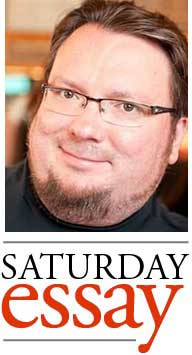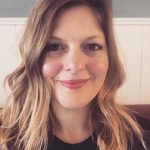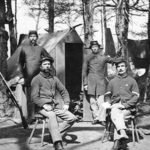Time of Waiting
 I remember her waiting up for my father
I remember her waiting up for my father
To come home from God knows where
In a yellow cab at 2:00 A.M.
And waiting for me in the school parking lot
In our old blue station wagon
When whatever it was I was practicing for
Ran late …
And I remember her waiting for me
At the airport when I got back from Japan,
Waiting for everything to be all right,
Waiting for her biopsy results.
Waiting.
— George Bilgere, “Waiting”
Waiting for Cancer
In 1956, in On the Origin of Cancer Cells, Otto Warburg tried to pin down the causes for the “mysterious latency period of the production of cancer.” Fifty years later, in Genetic Progression and the Waiting Time to Cancer, Niko Beerenwinkel, Tibor Antal, David Dingli, Arne Traulsen, Kenneth W Kinzler, Victor E Velculescu, Bert Vogelstein, and Martin A Nowak replace the “mysterious latency period” with talk about a waiting period: they set out to “derive an analytical formula for the expected waiting time for the progression from benign to malignant tumor.” They started with a “normal” cell and predicted the number of mutations the cell will undergo. Based on the number of mutations, they could calculate how long it will take for a normal cell to produce a benign tumor and how long before those mutations produce a tumor that becomes malignant.
In these mathematized models, cancer isn’t something to avoid. Good diet, exercise, proper meditation, retreating to a mountain cabin far from carcinogens in the air, the food, the water — these choices aren’t part of the calculation of cancer for these doctors, because cell mutation is inevitable, and so cancer is inevitable. Cancer was something you wait for.
The length of the wait depends on genetics; your cells may be more or less disposed toward mutation than mine. The length of the wait depends on the location of the cell in the body (colorectal cells have different mutation rates than lymph cells).
But the implications of the mathematical model are clear. You don’t avoid cancer; you wait for it. You might die before you are done waiting; you might be killed in a car accident at a young age, or you might die of a heart attack at ninety. In both cases, you die never having had cancer. But if you had lived a little longer, it would have eventually come.
The experience of cancer is defined by waiting.
How long we wait, with minds as quiet as time, Like sentries on a tower.
How long we watch, by night, like the astronomers.
— Thomas Merton, “How Long We Wait”
Waiting for Diagnosis (I)
In 2007, Mom almost received the bad news over the phone. The clinic staff would not share her results that way. If there were nothing wrong, presumably, she would have received a cheerful “all clear” over the phone. She was asked to come in. Immediately, in her brain and in mine, the only question remaining was what kind of bad news we would hear.
My then-wife and I drove to Milwaukee from Duluth. It’s a seven-hour drive, but I drove twenty over the limit. The faster we got there, I believed, the faster we could start doing something.
There was no rush. The doctors needed to complete a battery of tests to ensure the right diagnosis and appropriate course of treatment. Those tests would come slowly, as the clinic could schedule them. There just was no rush.
Pancreatic cancer killed my grandfather and my stepfather, both when I was too young to understand. The time between diagnosis and death was weeks. That was my only intimate experience of cancer. So: I wanted us to start treatment now. Every minute counted.
Among my mother’s doctors, there was no sense that rushing into the operating room or the chemo suite would change her outcomes
I had surrendered my position in the story to waiting. Philosopher Raymond Tallis tells us that when we are waiting, “we surrender our position at the centre of the universe … The narrative of our lives sometimes seems like a densely woven network of ‘not yets.’” We were entangled in the not-yets.
Waiting for Diagnosis (II)
In 2017, my ex-wife began piecing together her diagnosis in phone calls and test results on her “patient portal” website. There were “microcalcifications.” The microcalcifications are not cancer, but they are an indicator of cancer. More tests needed to be done.
In the meantime, at home, there was aggressive Googling. In the era of WebMD, there is little a doctor can say that can’t be shoehorned into diagnosis and prognosis. I wanted to see the doctor so she could tell me that I am wrong.
I sat in the waiting room outside the doctor’s office hoping to be wrong. I sat in the exam room, waiting for the doctor, hoping to be wrong.
Kate and I, we’d done that waiting before, with my mom. But we were still unprepared. We still wanted to act: scheduling appointments quickly, in clusters, as close to back to back as possible. We met with the surgeon, the oncologist, and two plastic surgeons. We made each appointment with a sense of urgency, but the openings appeared no faster.
We waited for the tests. We waited for the results. We waited for the opinions about the results to coalesce in tumor board meetings on the following Thursday morning. We waited for more than a month from diagnosis to the decision, and then we waited for the surgery.
Waiting … should not be thought in terms of doing nothing … Waiting should not be understood as a passivity.
— Marko Zlomislić
The Waiting Room
Check-in for Kate’s surgery was at six o’clock, for a pair of operations that started around eight o’clock and would last for somewhere between five and eight hours. After I squeezed her hands one more time, I headed to the waiting room.
I grabbed a chair in view of the TV. An hour in, I wanted coffee. By ten o’clock, I had been awake for six hours, and I had no idea how tiring waiting could be. Roland Barthes tells me that “the anxiety of waiting, in its pure state, requires that I be sitting in a chair … without doing anything,” and he is right to call it an anxiety. The anxiety is wearisome. By two hours into the surgery, I was wearing thin.
Coffee would have helped, but there are concerns in running for coffee, too: Barthes describes it well when he says that “I forbid myself to leave the room, to go to the toilet.” The coffeeshop is only ten minutes away if I walked briskly. If I leave, I am not waiting, or perhaps I am waiting badly.
The surgery still had hours ahead.
Waiting is exhausting, but it’s a low-level stress, the kind that is imperceptible: Again, once more to Barthes: “the anxiety of waiting is not continuously violent; it has its matte moments; I am waiting, and everything around my waiting is stricken with unreality.” By the fourth hour, as the cable news repeated the same stories for the sixteenth time, I was awake at the same time that I was exhausted.
The first surgeon came out to inform us of the results of the first surgery. While she was telling us that everything was going well, the plastic surgeon was beginning his work. We would return to our chairs and wait some more.
Waiting for “Free”
My mother describes herself as “cancer free,” a word that scared me because I thought it was too optimistic. No one was “cancer free” when I was growing up. You were “in remission” (hopefully indefinitely). No one ever used the word “cured,” because there was the sense, the gnawing insecurity, really, that the cancer would come back.
Remission is just a first phase now, on the way to “cancer free” or cured. According to the NIH: “Remission means that the signs and symptoms of your cancer are reduced … In a complete remission, all signs and symptoms of cancer have disappeared. If you remain in complete remission for 5 years or more, some doctors may say that you are cured.”
I left the waiting room outside the surgery knowing that the surgery was a success and so we could begin waiting again.
If we ask what we are waiting for, we are expecting something, we already have an object of expectation, whereas we need to remain open towards something we do not know … In waiting something opens. What we need to do is ‘just’ wait, wait without expecting.
— Barbara Dalle Pezze
About two years ago, mutual friends introduced me to someone whose company they thought I might enjoy. One did so with a gleam in her eye, the matchmaker’s gleam. This person has become one of my trusted friends, the kind of friend with whom you can speak openly about your feelings, and you hope that they feel the same with you.
Her diagnosis, for a more aggressive cancer, further advanced than my mother or ex-wife’s cancers, led to a darker prognosis. Treatment would be aggressive and debilitating. Life could be counted in months, not years.
Four years after her diagnosis, we talked about some of my experiences. I wince a little thinking about it — I was seeking support from someone who was still very much in the middle of her own walk with cancer. About half an hour into the conversation, I interrupted the flow to tell her this. “Two years ago, I didn’t think you’d still be here to help me think about things like this. I wasn’t sure you’d still be here at all.”
She’s still in treatment, as I write this. Because I had a sense that the story would be over soon, I stopped waiting for the ending. As a result, I didn’t notice that the predicted “end” had passed, and my friend was still with me.
Excerpts from this essay were included in Beard, David E. (2020) “Cancer and the Time of Waiting,” Survive & Thrive: A Journal for Medical Humanities and Narrative as Medicine: Vol. 5 : Iss. 1 , Article 6.
Recommended Links:
Leave a Comment
Only registered members can post a comment , Login / Register Here














No Comments